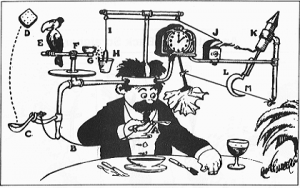The European Union: An Un-Democratic Leviathan That Britain Might Just Escape
America’s closest ally, Great Britain, stands on the brink of a profound decision, one that could determine whether it remains the free, prosperous democracy that has worked closely with the United States since World War II, or goes on morphing into something much smaller and sadder — a bullied province of that unaccountable oligarchy called the European Union.
Britain will make the decision next Thursday, in a referendum to exit the EU. The odds are looking stronger every day that the “Leave” voters will prevail. The Independent (U.K.) reports, “The campaign to take Britain out of the EU has opened up a remarkable 10-point lead over the Remain camp, according to an exclusive poll.”
British voters will decide, in short, whether they will continue to be engulfed by the creeping political unification of Europe. It’s a unification that U.S. leaders have long (and unwisely) supported, as have most British politicians representing all major UK political parties — except for Margaret Thatcher.
As Prime Minister, Thatcher raised concerns about the intrusive regulation and the loss of British sovereignty it would entail, and fought to get a rebate on the UK’s disproportionately large annual contribution to the EC budget. Her implied threat to take Britain out of the European Community created a heated debate at successive meetings of the European Council during the 1980s and did win her significant concessions. Yet even she did not explicitly propose leaving the Europe Community altogether (at least while she was in office), and her increasingly adversarial posture toward European unification led directly to her ouster as Conservative Party leader and the loss of her premiership in 1990.
An Undemocratic Union
Nevertheless, a significant segment of the British public has long been profoundly skeptical, with reason. Since the treaty known as the Single European Act was signed in 1986, the governments of the European powers have gradually ceded increasing control over their domestic policies to an unaccountable bureaucracy in Brussels. Indeed, the European Union vests immense power in the hands of a few unelected, and almost entirely unaccountable, commissioners, “representatives” and bureaucrats.
The only remotely representative body in the European Union — the European Parliament — plays at best a secondary role in shaping EU legislation. Most legislation is initiated and shaped in secret by two unelected bodies: the European Commission and the Committee of Permanent Representatives, or COREPER, the latter consisting of bureaucrats from member states.
 Proposals then go to a third body called the Council of Ministers, which includes one representative from each government of the 28 nation states. These ministers then vote to approve or reject the law, usually by a system of “qualified majority voting.”
Proposals then go to a third body called the Council of Ministers, which includes one representative from each government of the 28 nation states. These ministers then vote to approve or reject the law, usually by a system of “qualified majority voting.”
This system used to require 72 percent of the votes in the Council of Ministers representing the individual nation states for a law to become binding in all EU countries. Recent changes in the “legislative” process now allow a law to be enacted provided those ministers voting for the proposed legislation come from countries representing 55 percent of the population of the EU countries. It’s worth noting that since 1996, every piece of legislation to which the UK has objected has been approved in the Council via this system of voting.
On only a few areas of policy — such as foreign and defense policy, and justice and home affairs — do the nation states still retain veto power in the Council. On all other matters, elected national parliaments are entirely excluded from the legislative process, except insofar as they are required by treaty obligation to rubber stamp decisions that have already been approved in Brussels. In practice, that means between 50 and 70 percent of the UK’s major legislation and regulation now either originates in Brussels or must be coordinated with European Union policies.
Popular Discontent
Support for the EU among Britain’s political and media elite has long left Euro-skeptical voters — over-regulated fishermen, lorry drivers, farmers, tradesmen, labor unionists and small business owners — without effective representation. Nevertheless, that began to change with the rise of the United Kingdom Independence Party (UKIP) and its open advocacy of a “come out” position. UKIP’s successes in recent national elections have transformed it from a conservative protest movement to an increasingly national party and placed the issue of Britain’s continued participation in the EU at the forefront of British politics.
In the 2010 general election support for UKIP in key parliamentary constituencies cost the Conservative Party an outright majority and forced the Conservatives into a coalition with the Liberal Democrats. To blunt the appeal of UKIP in future elections, Prime Minister David Cameron offered the electorate this upcoming referendum on EU membership — for the first time since 1975. Nevertheless, in the last general election in 2015, UKIP came in third among all British political parties winning nearly 13 percent of the vote nationally.
UKIP drew support from working-class Labour voters (many concerned about EU-imposed open borders and unfettered immigration) as well as disaffected conservatives, demonstrating the breadth of skepticism about the project of European integration among rank-and-file voters in all major parties. This discernible Euro-skepticism in the 2015 election results has set the stage for the upcoming referendum, whose outcome should deeply interest all friends of freedom.


